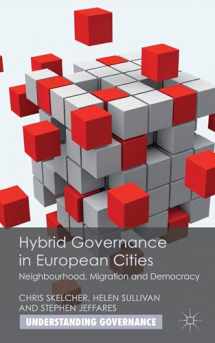
Hybrid Governance in European Cities: Neighbourhood, Migration and Democracy (Understanding Governance)
ISBN-13:
9780230273221
ISBN-10:
023027322X
Edition:
2013
Author:
Helen Sullivan, C. Skelcher, S. Jeffares
Publication date:
2013
Publisher:
Palgrave Macmillan
Format:
Hardcover
197 pages
FREE US shipping
Book details
ISBN-13:
9780230273221
ISBN-10:
023027322X
Edition:
2013
Author:
Helen Sullivan, C. Skelcher, S. Jeffares
Publication date:
2013
Publisher:
Palgrave Macmillan
Format:
Hardcover
197 pages
Summary
Hybrid Governance in European Cities: Neighbourhood, Migration and Democracy (Understanding Governance) (ISBN-13: 9780230273221 and ISBN-10: 023027322X), written by authors
Helen Sullivan, C. Skelcher, S. Jeffares, was published by Palgrave Macmillan in 2013.
With an overall rating of 4.2 stars, it's a notable title among other
books. You can easily purchase or rent Hybrid Governance in European Cities: Neighbourhood, Migration and Democracy (Understanding Governance) (Hardcover) from BooksRun,
along with many other new and used
books
and textbooks.
And, if you're looking to sell your copy, our current buyback offer is $0.3.
Description
How are responses to urban policy challenges affected by new ideas about governance? How can we explain the governance transformations that result? And what are the consequences for democracy? This wide-ranging study of three European cities – Birmingham, Copenhagen and Rotterdam - shows how hybrid forms of governance emerge from the tensions between new visions and past legacies, and existing institutional arrangements and powerful actors. Hybrid governance includes public-private partnerships, stakeholders boards, and multi-actor forums operating at arm's length to institutions of representative democracy. Offering detailed studies of migration and neighbourhood policy, as well as a novel Q methodology analysis of public administrators' views on democracy, the book explores how actors generate new practices, shows how these develop, and evaluates the democratic implications. The book concludes that hybrid governance is both widespread and diverse, is spatially and policy specific and that actors – public managers, politicians and the public – contribute to hybrid designs in ways that promote and challenge democratic conventions.


We would LOVE it if you could help us and other readers by reviewing the book
Book review

Congratulations! We have received your book review.
{user}
{createdAt}
by {truncated_author}


